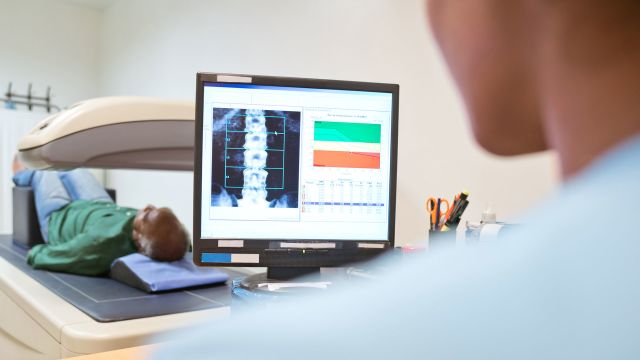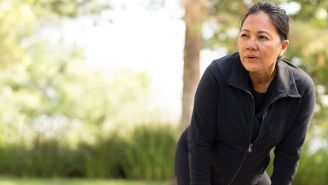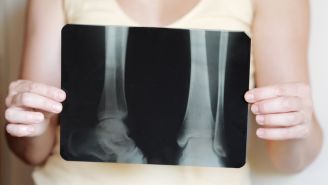Updated on June 9, 2023.
Osteoporosis is a disease characterized by weak and brittle bones. About 10 million Americans have the condition, according to the National Osteoporosis Foundation. Another 44 million have low bone density, which may lead to osteoporosis. Essential to the diagnosis and treatment of these conditions is a bone density test.
Your healthcare provider (HCP) will likely order a bone density test for you at age 65 if you are a woman with no risk factors, or earlier if you do have them, says Elizabeth Shane, MD, an internal medicine specialist in New York City. You can expect more screenings as you get older, especially if your HCP suspects seriously weakened bones. Men without risk factors usually get their first screening at age 70. In very high-risk cases, for both men and women, an HCP may recommend screening before the age of 60.
How a bone density test works
A bone density test measures the mineral content in your bones. Higher bone mineral content indicates stronger bones. Based on the results, your HCP can determine:
- If you're at risk for a fracture
- If you have osteoporosis
- How well your bones are responding if you're already in treatment for low bone density or osteoporosis
Bone density tests can be done with two types of devices:
Central DEXA (dual energy X-ray absorptiometry)
Central DEXA tests are performed using a large device that makes it possible to take X-rays of your hip and spine. Testing bone density in your hip and spine helps your HCP better understand your overall risk for a serious fracture and determine whether you have osteoporosis. A DEXA test takes about 10 to 15 minutes to complete, and the level of radiation is low. Like any other X-ray, a DEXA test is non-invasive and painless.
Peripheral screening tests
These tests—typically used when a central DEXA device isn't available—are done with smaller devices that measure bone density in the lower arm, wrist, finger, or heel. Peripheral tests can't accurately diagnose osteoporosis, but they can give your HCP a starting point to determine if further testing is needed.
What test results mean
Bone density screening test results come in the form of T-scores for postmenopausal women and men aged 70 and over and Z-scores for everyone else. A T-score compares your bone density to that of a healthy 30-year-old of your same sex. Generally speaking, the lower your T-score, the lower your bone density.
If your test results do indicate bone loss, your HCP may use a tool called Fracture Risk Assessment (FRAX). "It's a calculator that provides a percent probability of a fracture in the next 10 years," Dr. Shane says. Your HCP can use your FRAX score to help determine whether you need treatment for bone loss.
In addition to these screening tests, your HCP will take into account other risk factors, including:
- Loss of height (a half-inch or more in one year)
- Stooped posture
- Back pain
- History of broken bones as an adult
- Chronically low calcium
- Family history of osteoporosis
- History of smoking or heavy drinking
- Exercise habits and diet
Your HCP may also order other tests to rule out medical conditions that might be causing your bone loss.





